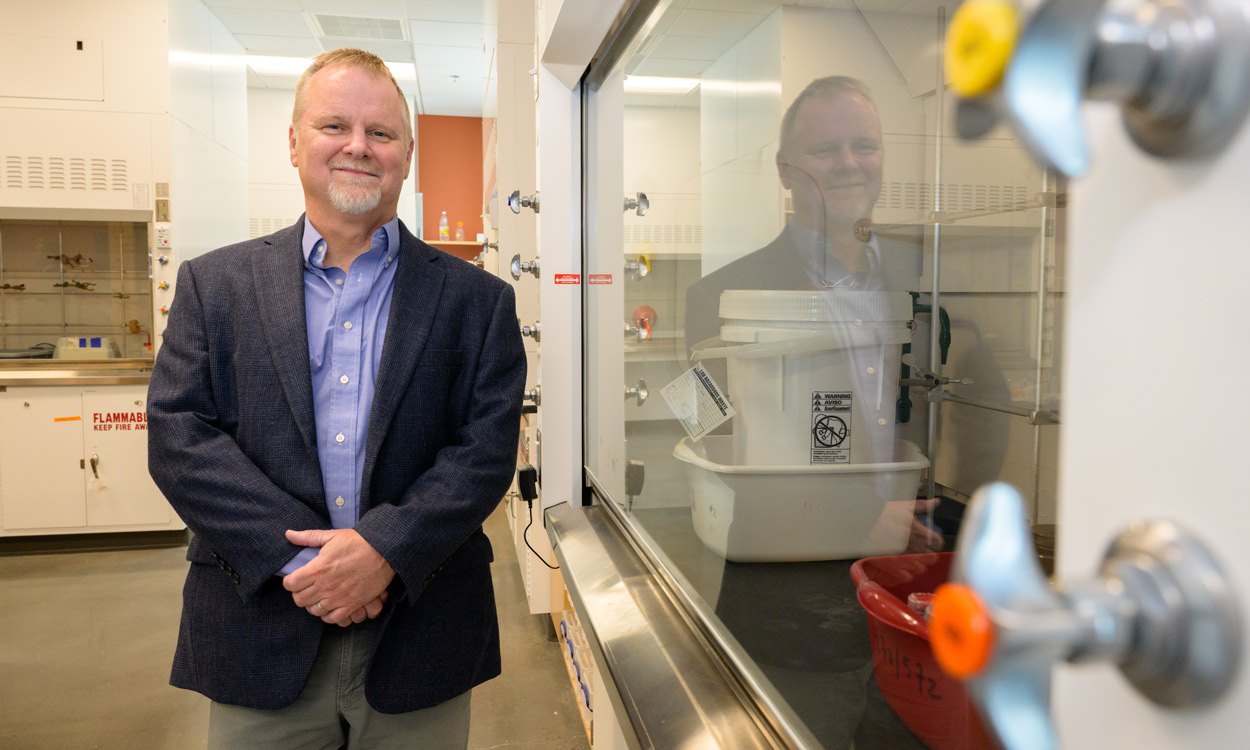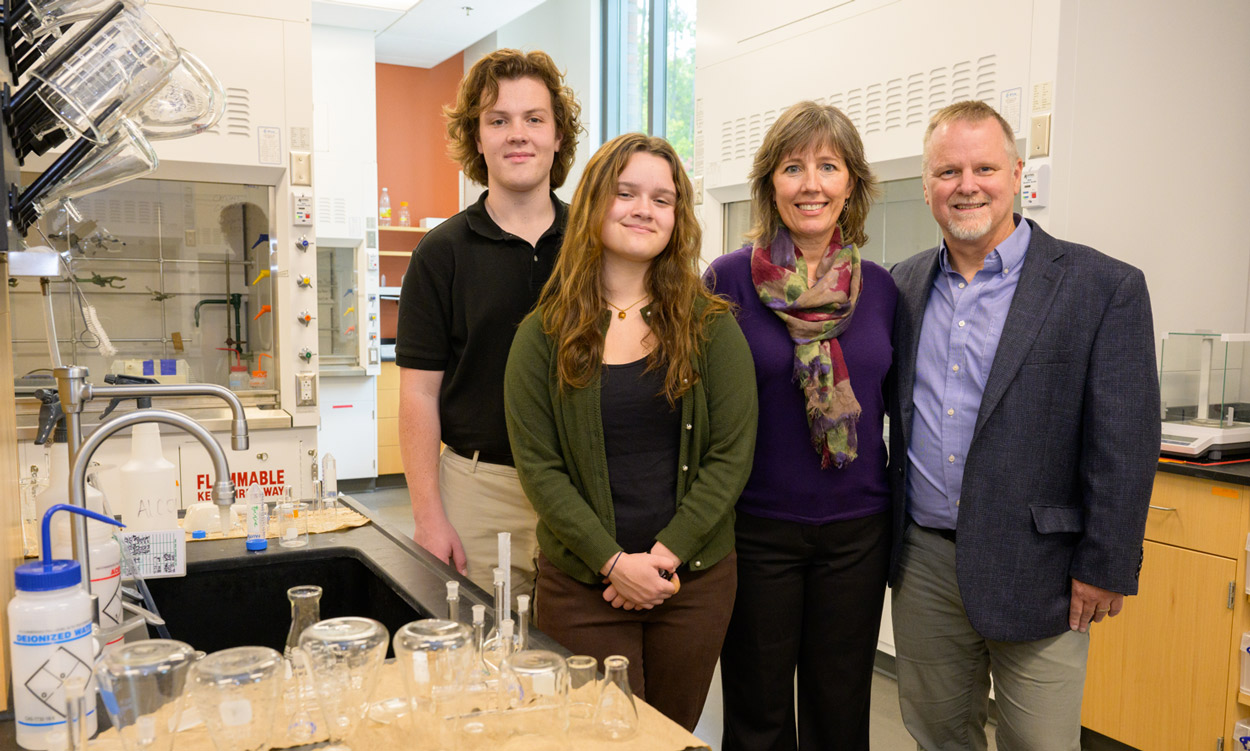Chemistry classroom named in recognition of gifts from alumnus Peter Newsome

Peter Newsome visits the Western Carolina University chemistry classroom that now bears his name.
By Bill Studenc
A Western Carolina University chemistry program alumnus with more than a dozen U.S. pharmaceutical patents to his credit has made financial contributions to WCU designed to help fill a growing demand for graduates of STEM disciplines, including chemistry.
President of pharmaceutical company Raybow USA, Peter Newsome recently contributed a total of $50,000 to benefit WCU’s Department of Chemistry and Physics, with $25,000 going to create the Newsome Chemistry Program Endowment and $25,000 toward the Chemistry and Physics Advancement Fund.
In recognition of those gifts, Room 326 in WCU’s Apodaca Science Building has been renamed the Dr. Peter Newsome Classroom. The new name for the classroom, approved previously by the WCU Board of Trustees, was announced during a ceremony Friday, Oct. 13.
“I just hope that others may find their way to the sciences just as I did years ago in a classroom not far from where Apodaca 326 is today,” said Newsome, who graduated summa cum laude from WCU with a bachelor’s degree in chemistry in 1984.
The Newsome Chemistry Program Endowment will provide funding for equipment for the department, support for experiential learning and professional development for students in the department and research assistance for students, with special consideration for activities in the area of organic chemistry.
The gift to the Chemistry and Physics Advancement Fund will be used to purchase a specific piece of equipment called a microwave reactor.
“It’s basically a souped-up microwave oven used for chemistry, but I don’t think anybody will be making popcorn in it,” Newsome said. “It allows you to run reactions much faster because you are able to achieve very high temperatures and pressures. The utility for universities is that you can run experiments on a very small scale so that you’re not having to spend a lot of money on chemicals and reagents, not generating much waste, and reactions occur more quickly – all of which make it an ideal tool for a teaching environment.”
A resident of Mills River, Newsome said that he hopes his gifts to WCU will increase the number of students majoring in chemistry and other science, technology, engineering and mathematics areas.
“What I’m seeing now and what I’m seeing in trends is that all STEM fields will continue to be in high demand in the future,” he said. “There is definitely demand now for chemists. If there are any students now who are like I was and looking for the right major but in need of assistance to stay in school, then I hope this endowment will be useful.”
David Kinner, dean of the College of Arts and Sciences, said that both of Newsome’s gifts will be used to support undergraduate student research through direct assistance and the purchase of equipment that students and faculty will use in the research process.
“We are grateful for Dr. Newsome’s support of research in the Department of Chemistry, as research allows our students to become knowledge creators and understand better what it is like to be a scientist,” Kinner said. “Hands-on experiences are an excellent way to learn, and we are excited that this gift will help make future research opportunities even more sustainable. Naming the space after Dr. Newsome is fitting, as his success in research chemistry and business can serve as an inspiration for our students.”
Although Newsome has been a regular donor to WCU since 1992, he decided to increase his philanthropy to his alma mater as he realized the impact the university had on his life and his career.
“If I’d been asked 10 or 15 years ago how my time was at Western, I would have said, ‘It was fine. I’d recommend it. It’s a good school.’ And it would have ended at that,” he said. “But as I thought about it more, I got to thinking about the path that I took and it’s not clear that I would have gotten into chemistry if I’d gone to a much larger institution.”
Newsome began his undergraduate career at WCU as a forestry major through a curriculum agreement with N.C. State University. “The good thing about that forestry program is that it was very science-based, so I was required to take science courses like biology and chemistry,” he said. “After a year in forestry, I realized I was more science-oriented.”

Western Carolina University alumnus Peter Newsome (far right) tours the newly named classroom in Apodaca Science Building with (from left) children Kai and Mina and spouse Kelley.
Newsome switched his major from forestry to undecided. He then declared his major in biology with a minor in chemistry before switching again, this time to a chemistry major with a biology minor. “I think I proved that the shortest distance between two points might be a straight line, but it’s not necessarily the best way to get there,” he said. “It was good that I was able to move freely about the cabin between those degree programs as I learned more about what I wanted to do.”
Newsome points to two cooperative education stints at Burroughs-Wellcome (now GlaxoSmithKline) as being critical to his professional journey.
“What was interesting is I was working in the middle of a medicinal chemistry group. There were six chemists in the lab, all essentially acting as my mentors. Not only did I learn lab skills quickly, but I was also able to see first-hand what chemists did when they went to work,” he said.
“I could look around the lab and see people with different degrees, see what their responsibilities were, and it really helped me understand the hierarchy of responsibility and education. I worked across the hall from a chemist named Gertrude Elion, who, a couple of years after I left, was awarded the Nobel Prize in chemistry. It was a really cool time to be there with really great people,” he said.
Newsome credits two WCU professors for serving as mentors who set him along his career path – Royce Woosley for his organic chemistry lectures and Gary Poole for his laboratories.
“Royce Woosley was just so good at telling the story of chemistry. What was appealing about the subject was that once you learned the principles then you could apply them to chemistry you had not previously seen. He was just very good at explaining those principles to you. I liked the way he organized his class and taught. He was patient and the way he taught was very engaging,” he said.
“The thing about Dr. Poole was he was probably the most frustrating professor I ever had because he would never answer a question, preferring instead to ask you more questions. Basically, he was leading you through the scientific method. I would ask, ‘Why am I observing this,’ and he would say something along the lines of, ‘What do you know about what causes these kinds of properties,’ so you would just reason it out and come to the answer yourself. It was highly effective,” Newsome said. “That’s really what you go to college for – not to learn stuff out of a book but learn how to think for yourself.
After graduating from WCU, Newsome completed a doctorate in organic chemistry in 1989 at the University of Utah. He joined French chemical and pharmaceutical company Rhone-Poulenc, working there for a decade before co-founding PharmAgra Labs, a chemistry contract research organization.
Initially located in Arden, PharmAgra moved to a former textile building in Brevard in 2003, which now serves as the headquarters for Raybow in the United States. PharmAgra Labs became Raybow USA upon its acquisition by Raybow PharmaScience in November 2019.
Since 2012, Newsome has served as a director for Ardeal Research Institute, a nonprofit economic development organization focused on fostering biotechnology research and jobs in Western North Carolina.
For more information on helping students pursue their higher education goals, contact the WCU Division of Advancement at 828-227-7124 or advancement@wcu.edu, or visit give.wcu.edu.

